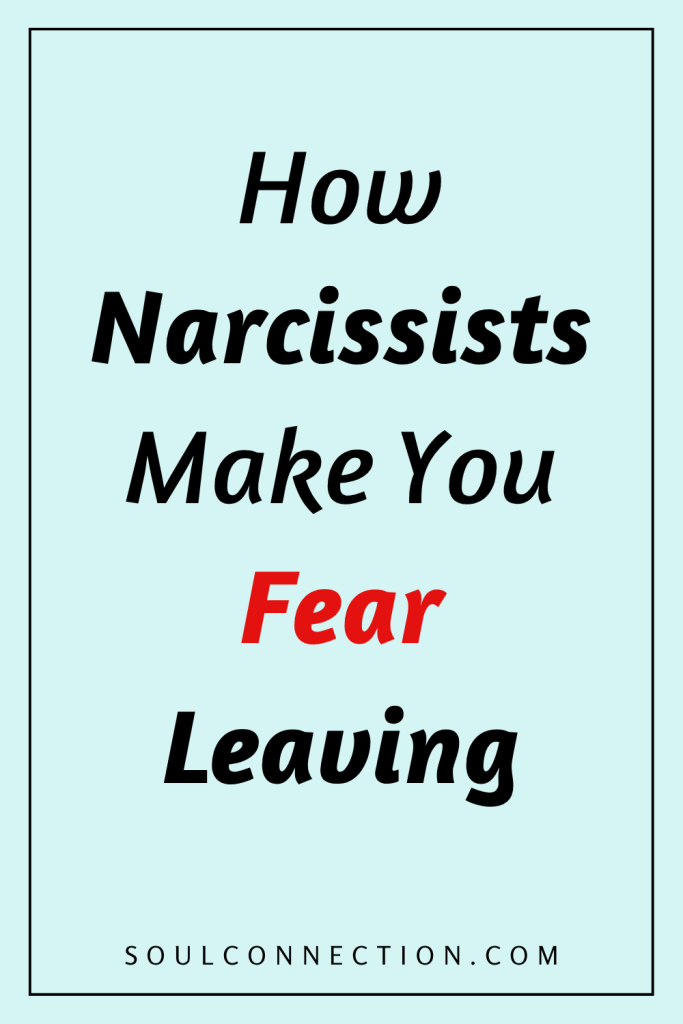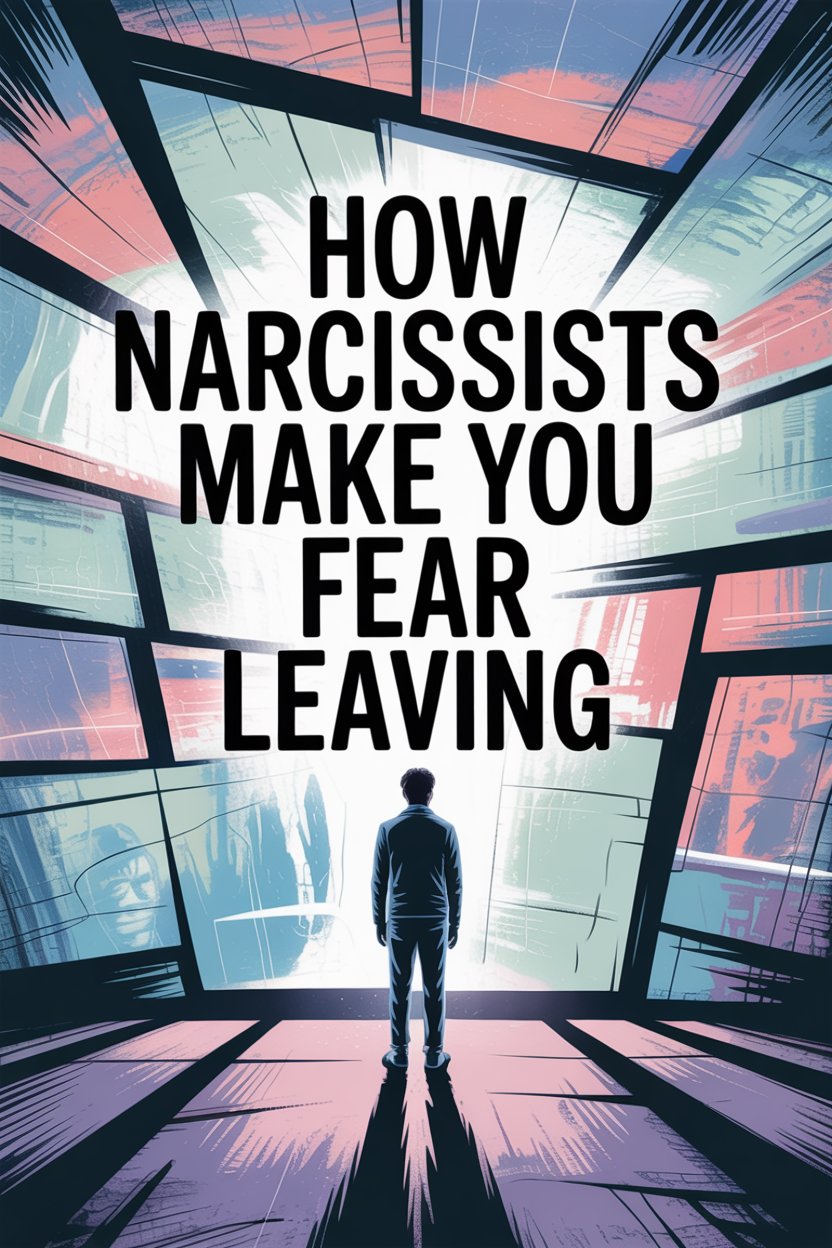Leaving a narcissist can feel like trying to escape quicksand—each time you think you’re out, another sticky tendril pulls you back. People say “just leave,” as if it’s as easy as returning your neighbor’s lawn mower.
The reality? A narcissist is an expert at manufacturing fear, self-doubt, and confusion, and those are some mighty heavy bags to carry.
Ready to unpack how they make you terrified of walking away?
The Art of Gaslighting
Welcome to the narcissist’s favorite magic trick: gaslighting. This is mind-bending at its finest, where your reality is not just questioned—it’s systematically dismantled.
One day you’re adamant about what you saw or heard; the next, you’re apologizing for “misunderstanding” something as clear as daylight.
Narcissists twist facts, deny things they’ve said (even when you have the receipts), and act outraged at your “crazy” accusations.
Over time, this kind of mental gymnastics leaves you doubting not just your memory, but your own grip on reality. Suddenly the idea of leaving feels reckless—if you can’t trust your own mind, how can you trust your decisions?
Isolation: Their Favorite Social Hobby
Narcissists are marathon runners when it comes to chipping away at your support system.
Friends? “They’re jealous of us.” Family? “They never liked me, and they’re trying to ruin what we have.” Colleagues? “They don’t really care about you.”
Little by little, those lifelines you once had—brunches, late-night phone calls, family holidays—become fewer and further between. Before long, it feels like the only person who “gets” you is the very person making your life hell.
This manufactured loneliness isn’t accidental. If you feel like you have no one to turn to, the prospect of leaving is enough to make anyone double-check their exit strategy (or curl up on the couch with a blanket and a vague sense of dread).
The Threat Parade
Nothing keeps a person glued in place quite like a good, old-fashioned threat. Narcissists are pros at hinting, or outright declaring, that leaving them will unleash chaos.
Maybe they’ll threaten to harm themselves (“I can’t live without you”), ruin your reputation (“I’ll tell everyone you’re unstable”), take the kids, or drain your finances.
Even if you know deep down some of these threats are bluffs, the risk is enough to keep anyone paralyzed. After all, who wants to gamble with their children’s wellbeing, their job, or their own safety?
Narcissists count on that fear—and milk it for all it’s worth.
Guilt Trips and Emotional Blackmail
Ever tried booking a guilt-free getaway from a narcissist? Not happening.
They’ll remind you of every nice thing they ever did, every sacrifice they made (“Remember when I let you pick takeout that one time in 2017?”), and how much leaving would devastate them.
Expect tears, rants, and Oscar-worthy displays of heartbreak. The message is clear: If you leave, you’re cold, ungrateful, and heartless. It’s emotional blackmail in its Sunday best.
Making You Feel Incompetent
Narcissists are excellent at making you feel like you need them. Can you really manage the bills, the house, the car, the kids—heck, life itself—without their guiding hand?
They’ll insinuate (or tell you outright) that you’re a hot mess who should feel grateful they put up with you.
Soon, you start to believe it. Independence seems like a distant fantasy—something other people get to have. Not you, though. Not when you’re so “flawed.”
Love Bombing After Bad Behavior
Just when you reach your breaking point, the narcissist pulls a 180 and showers you with affection. Gifts, grand gestures, tearful apologies—suddenly, you’re the most cherished person on earth.
This is called love bombing, and it’s designed to scramble your emotional radar. The cycle of cruelty and affection keeps you hooked.
Every time you think about leaving, a flood of sweet memories and “maybe it’ll be different this time” thoughts rush in.
It’s emotional whiplash—and it’s intentional.
The Myth of the ‘Soulmate Connection’
Narcissists love to sell the idea that what you have is rare. Unique. Cosmic. They’ll say things like, “Nobody will ever love you like I do.” (In fairness, that’s probably true, but not in the way they mean.)
This soulmate sales pitch makes the idea of leaving feel catastrophic. Are you really going to walk away from The One? What if you never find love like this again?
Spoiler: You absolutely will—and you’ll like it a lot more.
Shifting Blame and Playing the Victim
In the universe of the narcissist, nothing is ever their fault. If you bring up their bad behavior, expect mental gymnastics that would put Olympic athletes to shame.
Suddenly, you’re the abuser. Or the unappreciative partner. Or the one “always starting drama.” If you leave, they’ll tell anyone who’ll listen that you ruined everything.
The thought of being painted as the villain (when you’ve been the one tiptoeing around their moods for years) is enough to make anyone stay put.
Keeping You in a Constant State of Uncertainty
With a narcissist, predictability is about as common as a unicorn sighting. One day they’re loving, the next they’re cold, and the day after that, who knows?
This keeps you on high alert, always trying to please them or avoid the next blow-up.
The unpredictability is exhausting—and it makes planning an escape feel like defusing a bomb in the dark. Who wants to risk setting off an explosion?
Reinventing the Past
Narcissists have a creative relationship with history. If you confront them with facts, they’ll insist things happened differently. Good memories get exaggerated; bad ones are denied or blamed on you.
This revisionist history can mess with your head, making you doubt if things were really that bad. Maybe you’re overreacting. Maybe you’re the problem. That self-doubt is sticky stuff—and it keeps you in place.
Why Their Tactics Work
All these tactics aren’t just random acts of cruelty. Narcissists are experts at survival—specifically, their own. They know instinctively which buttons to press, which stories to tell, and when to turn on the charm or the chill.
They want control, admiration, and a guaranteed ego supply. Someone walking out the door threatens all three. So, they’ll do what it takes to make the door feel miles away, no matter how close it actually is.
Getting Your Power Back
Breaking free from a narcissist isn’t about flicking a switch and strutting off into the sunset. It’s about rebuilding trust in your own perceptions, reconnecting with people outside the narcissist’s influence, and recognizing their tactics for what they are.
Confide in someone safe. Reach out to a therapist or support group. Start making small, private plans—no need to announce your every move.
Most importantly: remind yourself that the fear isn’t a reflection of your weakness, but a sign of how thoroughly the narcissist has worked to keep you small. Every step toward reclaiming your independence—no matter how tiny—matters.
Walking Away Is Brave, Not Selfish
Narcissists thrive on fear because it keeps you from seeing what they already know: You’re stronger than you think. You can leave. You can heal.
And you can find peace, laughter, and love that doesn’t leave you staring at the ceiling at 2 a.m. wondering if you’re losing your mind.
Walking away isn’t abandonment. It’s not betrayal. It’s the bravest act of self-love you can give yourself.
And if anyone tries to tell you otherwise, remind them that you’ve survived a narcissist. You can survive anything.


